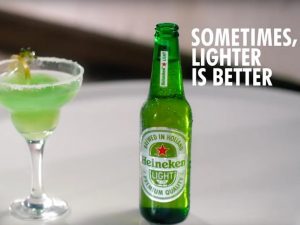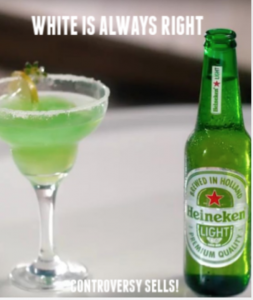
“Heineken Light”
Influence from the media and multinational corporations is inescapable in a highly globalized and capitalized 21st century, which increases the importance of cultural jammers. The term cultural jamming refers to “an organized, social activist effort that aims to counter the bombardment of consumption-oriented messages in the mass media” with its satirical undertones highlighting the problematic nature of consumer capitalism (Carducci 117). In early 2018, Heineken, an extremely popular beer brand, revealed its new Heineken Light Beer, with the slogan, “sometimes, lighter is better”. Along with the advertisement pictured above, there was a commercial released which featured a bartender sliding a Heineken Light past dark-skinned people of colour to a fair-skinned woman with the slogan appearing once it reaches her. Evidently, the company should have known better than to release a campaign centered around a slogan that perpetuates societal standards of lightness, especially in the current climate of the United States, where police brutality and racial injustices are rampant.
It is disheartening that it took the voices of various celebrities, like Chance the Rapper, to highlight the blatant display of racism in order for the company to take down their offensive advertisement. The company issued a statement declaring that they “missed the mark [and] are taking the feedback to heart and will use this to influence future campaigns” (Snider 2018), however, their response is inadequate because they should have known better in the first place. People continue to be discriminated on the basis of skin colour and when major conglomerates feed into this frenzy it heightens feelings of alienation that dark-skinned people already have living in a society obsessed with promoting whiteness. There is no accountability for these companies who continue to spew hurtful rhetoric, then subsequently follow that up with a halfhearted apology, which is insufficient as damage is already done. Heineken could have marketed their new light beer as a reduced calorie, pale ale, but the company chose to go in an offensive direction. As Glenn (2008) articulates there is a misperception that “skin tone is…a form of fixed or unchangeable capital, [but] in fact, men and women may attempt to acquire light-skinned privilege” because of society’s unhealthy fixation with whiteness (282). When companies release offensive and racist campaigns it is not their stocks that suffer, rather it is the marginalized people in society who are affected the most by these egregious actions, indicating that there needs to be consequences for these companies who know better and must do better.

“Heineken Light” (Jammed)
In my culturally jammed recreation of the Heineken advertisement, I choose to replace the original slogan of “sometimes, lighter is better” to “white is always right” because it is abundantly obvious that is the message that is being furthered. By altering the slogan, it becomes clear that the true intention of this advertisement is not concerned with promoting a new beer, rather its purpose is to continue to reinforce rigid societal standards. This reveals that just like how Heineken has lightened their beer, we should follow the same path and lighten ourselves in order to better fit into society’s mold. The past few decades have seen the skin-lightening industry become a multi-billion dollar industry and it is highly related to transnational flows of capital (Glenn 285). Most racial and ethnic minorities have a lengthy history of colourism as a result of European colonialism, so when corporations release advertisements promoting whiteness it is a regression towards harmful European beauty standards. Too often when corporations release hurtful and repulsively offensive advertisements, they do it in a way that leaves room for interpretation, often getting the benefit of the doubt from the masses. Changing the slogan to its deliberate meaning of “white is always right” signifies that there is no room for misunderstanding of what this advertisement means. These immense corporations will only face repercussions for their actions once people stop giving them the benefit of the doubt despite surrounding uncertainty.
Additionally, I decided to add a tagline at the bottom of the advertisement that states “controversy sells” because it is apparent that these corporations, while receiving a degree of backlash on social media, are never truly affected by their careless choices. For example, after the release of the exceedingly problematic 2017 Kendall Jenner Pepsi commercial, Pepsi’s “shares…surged 7.1%, making it one of the best performances from the slow-growth consumer” which denotes that these companies profit off of their controversy (Sozzi 2017). These corporations want to garner people’s attention more than anything else and now there is heightening concern that racist and offensive advertisements are actually intentional in order to fuel clicks for the company. If this is the case with Heineken, who followed in Pepsi’s footsteps realizing that any press is better than no press, then they should face immediate consequences. In an era where global capitalism is on an unprecedented rise, consumers need to be aware of the various tactics used by corporations and see the extent of the harm which they inflict upon others.
References
Carducci, V. (2006). Culture Jamming. A Sociological Perspective: New School for Social Research, 6(1), 116-138.
Glenn, E. (2008). Transnational Circuits in the Marketing and Consumption of Skin Lighteners. Gender and Society, 22 (3), 281-302.
Snider, M. (2018, March 27). Heineken Pulls ‘Lighter is Better’ Commercial After Some Call It Racist. USA Today. Retrieved from https://www.usatoday.com/story/money/business/ 2018/03/27/heineken-pulls-lighter-better-commercial-after-some-call-racist/461395002/.
Sozzi, B. (2017, April 5). Kendall Jenner Pepsi Commercial Made Me Look at the Stock; I Was Surprised. The Street. Retrieved from https://www.thestreet.com/story/14074263/1/kendall-jenner-pepsi-commercial-made-me-look-at-the-stock-i-was-surprised.html.
USA Today. (2018, March 27). Heineken Pulls Ad That Many Are Calling Racist. [Video file]. Retrieved from https://www.youtube.com/watch?v=euDi7zqDGMs.